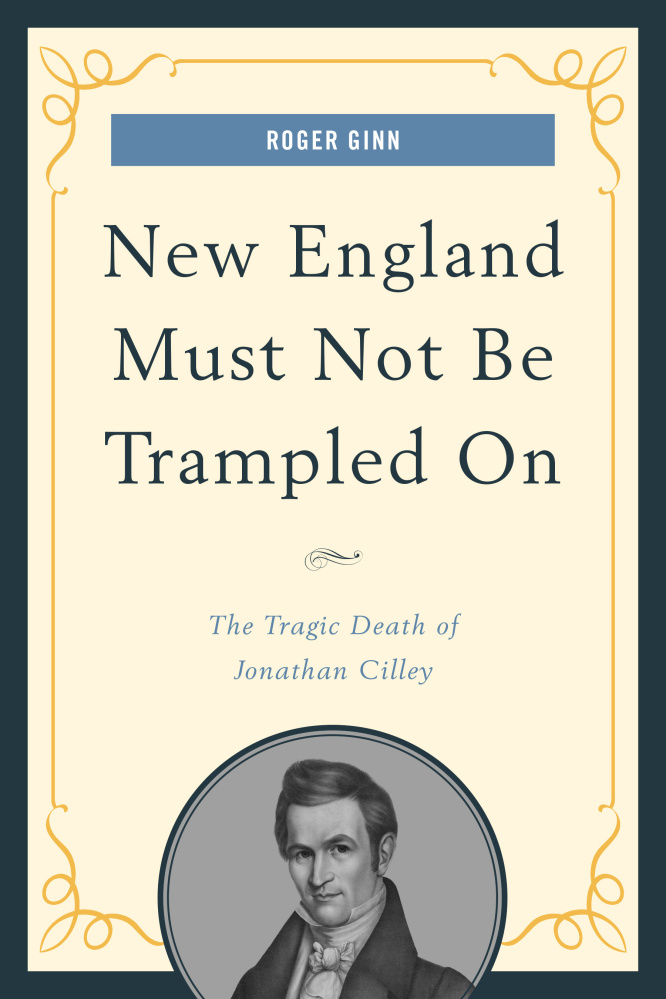Jonathan Cilley is remembered today as a freshman congressman from Maine mortally wounded in a 1838 duel with another congressman.
The point of honor on which the action was waged is convoluted and largely forgotten, though the more attuned historical readers probably know that Cilley graduated with the famous Bowdoin College class of 1825, which included Henry Wadsworth Longfellow, Nathaniel Hawthorne, a U.S. senator and two other subsequent congressmen.
Shortly after Cilley’s dramatic death, there was a barrage of editorial memorials and a biographical sketch by classmate Hawthorne. By the time of the Civil War, Cilley and the once notorious incident were regulated to footnote status.
In 2002, Eve Anderson published the attractively packaged volume, “A Breach of Privilege: Cilley Family Letters, 1820-1867,” a 500-page compendium focused on the politician and his family up through the rebellion. This provided important documentary insight and wonderful illustrations.
Now follows a fascinating psychological and political biography of Cilley by Wells psychologist Roger Ginn. “New England Must Not be Trampled Upon” is a clear, thoughtful book examining what would motivate an intelligent, ambitious, educated individual to meet another supposedly like-minded person with loaded rifles on the so-called field of honor.
In fact the Code Duello had been outlawed in Washington, D.C., by the very body the duelers served in. To satisfy honor, they had to step into the pastures of Maryland.
The duel was a way of life among Southern gentlemen who saw themselves in the upper strata of society. Among New Englanders, it was considered bad form and a “stupid” way of solving an impasse. However, it was often a defining fact in the Early National Period: Aaron Burr fatally wounded Alexander Hamilton, Capt. Stephen Decatur was shot dead by a rival officer, and President Jackson, who was just leaving office, was a walking receptacle for old shot gained in dueling.
Ginn does a wonderful job of capturing the era, attitudes in the various regions concerning honor and arms, codes and belief systems. He also delves into Cilley’s personality, family, community life and political beliefs.
Ginn does well by Cilley’s adversary, Congressman William Graves of Kentucky, as well as newspaper owner James Watson Webb and all those around Cilley.
The crux of the dispute, well told by Ginn, concerned a letter from Webb to Cilley, delivered by hand by Graves.
Cilley refused to take Webb’s letter, setting off a series of ridiculous and seemingly reversible events.
Where does the blame lie? That’s for readers to discern.
For all his agonizing over a trifling affair, Cilley sacrificed life, love, family and even reputation.
Indeed, Ginn’s study shows the congressman to have been somewhat hollow, more interested in his career and what people thought about him than the great issues of the day.
If there was a tragedy, it was of Cilley’s own making.
William David Barry is a local historian who has authored/co-authored seven books, including “Maine: The Wilder Side of New England” and “Deering: A Social and Architectural History.” He lives in Portland with his wife, Debra, and their cat, Nadine.
Copy the Story LinkSend questions/comments to the editors.



Success. Please wait for the page to reload. If the page does not reload within 5 seconds, please refresh the page.
Enter your email and password to access comments.
Hi, to comment on stories you must . This profile is in addition to your subscription and website login.
Already have a commenting profile? .
Invalid username/password.
Please check your email to confirm and complete your registration.
Only subscribers are eligible to post comments. Please subscribe or login first for digital access. Here’s why.
Use the form below to reset your password. When you've submitted your account email, we will send an email with a reset code.